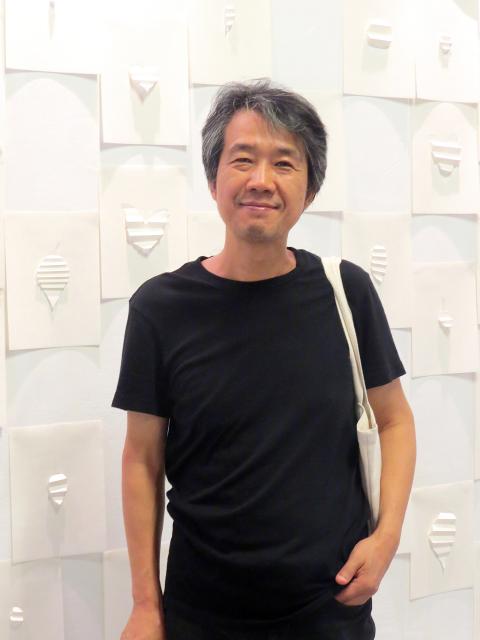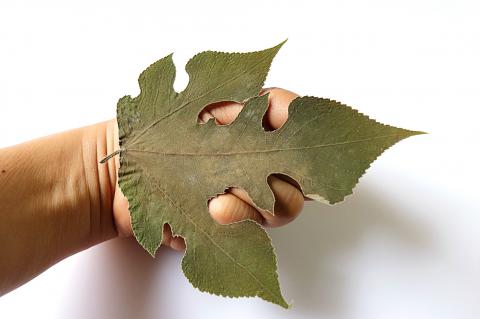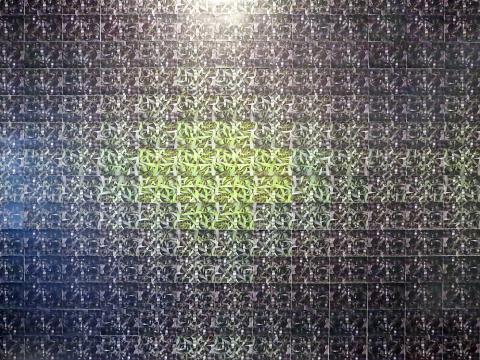Jeon Won-gil is director of Yatoo International Project, the online division of a South Korea-based collective that specializes in nature art. Since 2004, Yatoo has organized the Geumgang Nature Art Biennale, an event that invites artists to create site-specific installations by the Geumgang riverbank.
Over the past few months, Jeon has been doing his own residency within the Treasure Hill Artist Village (寶藏巖國際藝術村).
This is a small pocket of foliage in Taipei, a former squatter community that has become a cultural preserve. Walk 12 minutes down the street and it’s the heart of Gongguan, a neighborhood with shops and a university. There’s greenery on campus, but surrounding it most of the trees have been cleared.
.jpg)
Photo: The Sign of Typhoon
Jeon spends the majority of his day in the village, replicating plants in works that are on view today at mixed media solo show The Sign of Typhoon.
In the titular work, The Sign of Typhoon, he has papered over one wall with hundreds of treated photographs of wild ruellia, featuring one, two or three leaves folded gently in the form of a staircase.
The images are processed into a shade between their original color and pitch black, then arranged on the wall in a stairs-like descending pattern based on the number of folded leaves.

Photo: Leaf and stair
Viewed from afar, the collage’s mottled green center blooms out in black all the way to the corners of the wall.
“The stairs are the building block of human civilization — without stairs we cannot build a place or home or cities,” he said.
“The more stairs there are, the more black in nature you will see.”

Photo courtesy of Jeon Won-gil
In Palm Grass, a video installation, he presents leaves collected from around the hill and preserved between the pages of a book. Each is brittle and veined with mold. They flash in silence, pressed over a human hand that is stretched out for a palm-reading.
It’s an explicit statement that the future of humanity depends on the natural environment, Jeon said.
“Man needs the earth. If the future of the earth is bad, our future is bad, too,” he said.

Photo: Enru Lin, Taipei Times
The film also addresses a different human vulnerability.
“We badly want to know the future, and we even look for it in signs such as unusual lines on a palm,” he said.
One answer to what the future holds is devoid of mystery and is literally written on the other wall: Like the wild ruellia, civilizations will rise and ultimately fall.
“I live in the countryside and in Korea the seasons are very clear. In the spring, everything comes and the earth gets green and in the summer it deepens. In autumn the colors change and in winter they disappear,” he said. “That is the way. Again, they appear and disappear.”

June 23 to June 29 After capturing the walled city of Hsinchu on June 22, 1895, the Japanese hoped to quickly push south and seize control of Taiwan’s entire west coast — but their advance was stalled for more than a month. Not only did local Hakka fighters continue to cause them headaches, resistance forces even attempted to retake the city three times. “We had planned to occupy Anping (Tainan) and Takao (Kaohsiung) as soon as possible, but ever since we took Hsinchu, nearby bandits proclaiming to be ‘righteous people’ (義民) have been destroying train tracks and electrical cables, and gathering in villages

Dr. Y. Tony Yang, Associate Dean of Health Policy and Population Science at George Washington University, argued last week in a piece for the Taipei Times about former president Ma Ying-jeou (馬英九) leading a student delegation to the People’s Republic of China (PRC) that, “The real question is not whether Ma’s visit helps or hurts Taiwan — it is why Taiwan lacks a sophisticated, multi-track approach to one of the most complex geopolitical relationships in the world” (“Ma’s Visit, DPP’s Blind Spot,” June 18, page 8). Yang contends that the Democratic Progressive Party (DPP) has a blind spot: “By treating any

Swooping low over the banks of a Nile River tributary, an aid flight run by retired American military officers released a stream of food-stuffed sacks over a town emptied by fighting in South Sudan, a country wracked by conflict. Last week’s air drop was the latest in a controversial development — private contracting firms led by former US intelligence officers and military veterans delivering aid to some of the world’s deadliest conflict zones, in operations organized with governments that are combatants in the conflicts. The moves are roiling the global aid community, which warns of a more militarized, politicized and profit-seeking trend

This year will go down in the history books. Taiwan faces enormous turmoil and uncertainty in the coming months. Which political parties are in a good position to handle big changes? All of the main parties are beset with challenges. Taking stock, this column examined the Taiwan People’s Party (TPP) (“Huang Kuo-chang’s choking the life out of the TPP,” May 28, page 12), the Democratic Progressive Party (DPP) (“Challenges amid choppy waters for the DPP,” June 14, page 12) and the Chinese Nationalist Party (KMT) (“KMT struggles to seize opportunities as ‘interesting times’ loom,” June 20, page 11). Times like these can